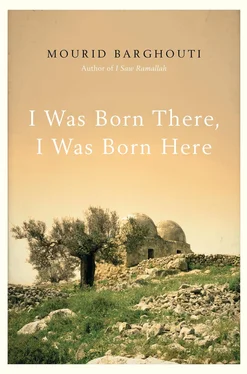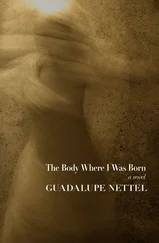When the time comes for Tamim’s deportation, the deportations officer will allow me to accompany him. Two members of the security forces, charged with guarding him up to the last moment, ride with us. Near the end of the long, crowded, choking road to Cairo Airport, the driver, ‘Abd al-‘Al, gives me a word of advice: “Don’t forget the tips, Mr. Mourid.”
“The tips?”
“Yes, sir. The tips.”
“For whom?”
“For them.”
“Are you joking? Tips for the men deporting my son, ‘Abd al‘Al?”
He whispers in my ear, “So that everything goes alright at the airport, sir. So they don’t complicate matters.”
“How much?”
“Whatever you think proper, sir.”
“Fifty pounds? A hundred pounds?’
“Keep going, sir.”
I pay the tips to the two men.
I am going to keep Tamim company on the plane to Amman. This time they allow Radwa to say goodbye to us, so she comes in another car with her friend Hasna Mekdashi.
The plane’s front wheels rise and we are airborne. I feel as though I too am being deported and expelled a second time. I relive the day of my expulsion from Egypt in 1977 as though it still hadn’t turned into the past. All the people in the airport’s halls — the hundreds packing its front hall to say goodbye to their departing relatives, the dozens standing at the counter where the tickets are checked and the baggage weighed, the parallel rows for the passport stamping windows, the customers in the café in front of the gates leading to the boarding areas — all these are not here at the airport to say goodbye, travel, drink coffee and tea, or mount the steps to the departing aircraft; they are here to gaze at the iron shackle that links my wrist to that of the policeman accompanying me, who drags me through the halls before the eyes of all like a heavy suitcase.
This fat old woman will think I’m a thief. That teenage girl will think I raped a girl her own age. This customs officer with the dyed hair will think I’m a currency smuggler who has fallen into their hands as a result of brilliant planning, or an international criminal that Interpol has finally succeeded in catching after years on the run, and that now I’m being taken off under guard to suffer my punishment. A traveler in a hurry who treads on my foot by mistake and doesn’t apologize will think I represent some kind of danger and that getting rid of me is a matter of urgency to him personally. It will never occur to them that I’m a poet whom authority, or the regime, is afraid of. So many of the country’s intelligentsia and its important writers let the country — and the people — down that authority isn’t afraid of them any more. People stopped reading poetry when poets deluded themselves into thinking that modernism meant gibberish. At the same time, they watched many literary icons colluding with the ruler. They did this in three ways: by desperately striving to obtain his approval; or, if that failed, by desperately striving to avoid his anger; or, if that failed, by quitting and migrating either to their inner worlds, which had been destroyed by melancholy, or to the world outside them, where they found themselves caught between the jaws of absence and of forgetfulness.
Certainly, everyone at the airport today will think I’m a criminal. No one will think I’m a poet who writes and rewrites a poem time after time until the poem is happy with its shape and I am happy too. I’m not a hero that I should feel pride, and I’m not a criminal that I should feel shame.
During these moments, I’m a person without feeling.
As though I were dreaming that I’m dreaming.
As though I weren’t here, weren’t with them, weren’t with anyone, weren’t coming from anywhere, weren’t going anywhere. As though it were someone else they were taking away.
This was my state exactly as I fumed and almost exploded, though appearing before all those people as calm as an ironed shirt in a drawer full of clothes.
This was my state exactly as I wished I were a Greek god so that I could kick the blank walls of the airport with a sacred rope sandal and leave its high ceiling resting on nothing but the pillars of my curses.
On that day, when the past had still to become the past, the policeman took me up the stairs and all the way to my seat on the plane. Only there did he undo the shackles that linked my wrist to his, and leave.
I know what the others passengers thought as I came through the door of the plane in shackles. I know why the flight attendant switched the smile in which she’d been trained for so many months for a fearful look of suspicion and then averted her face. I know why, when she put the meal down in front of me, she did so as though she were a faceless prison guard thrusting a loaf at the prisoner through the aperture in his cell door. I know that people find it the more comfortable option to respect you if they see that someone else respects you and to despise you if they see that someone else despises you. But shouldn’t a person make up his own mind? Shouldn’t he examine the reasons to respect or despise you? I tell myself sometimes, especially when things are a little mixed up, that the brain is the laziest of the body’s members and its dullest.
Alone, between sky and earth, I think of Radwa.
Radwa would pay for the policies of Sadat and his successor Mubarak in the coin of her own private life. She would experience the expulsion of her husband and dedicate her time to caring for her son without the presence of his father for seventeen years, except for short and intermittent periods. When she was obliged to undergo a life-threatening operation, she would be alone with Tamim, who was not yet three years old, while I was in Budapest and forbidden to put my mind at rest about her and be by her side. My mother flew to Cairo the moment she heard of the disease and that lightened the burden for me a little. Once more I had failed to be where I ought to be.
I fail to love, or show tenderness, or support, or help, or to look after, or be of use to those whom I love.
I had left Budapest for Doha to visit Mounif, Majid, and ‘Alaa. While there, I got a telephone call from Radwa informing me that she had to have a major operation that couldn’t wait.
What can the banished do to defeat a state, when their bodies are singled out as the target of its army, its police, its prisons, its borders, its stamps, and its ‘sovereignty’? Whenever anyone tried to intercede with a senior Egyptian official to allow me to visit or to have my name removed from the blacklist at the airport, he was told, “It’s a matter of sovereignty.” Long live sovereignty!
If one could voluntarily decide to go mad, I would have decided to go mad.
It occurred to me that the lucky Arab is the one who wakes up one morning and finds that he’s gone mad. That way it’s all over.
I haven’t gone mad.
Or has a thread of madness accompanied me till now, without my being aware of it?
I returned from Doha to Budapest stricken with silence. I turned the key in the door, sat down on the chair to rest for a few minutes before opening my suitcase, and woke up the next day still fully dressed. I went to work and found I couldn’t stand the voices of my colleagues. Every time one of them opened his mouth, I wanted him to shut up. I asked for permission to leave.
That mood didn’t last for more than a day.
I didn’t realize at the time how much ground I had covered in terms of educating myself in getting used to things being disordered, in getting used to the fact that things were by their very nature disordered. The process had begun slowly and with difficulty in June 1967 and continued to firm up by degrees as I underwent all the other unpleasant personal shocks which, with time, had ceased to shock me, by which I mean that I became too dulled to collapse or grumble at my pains. I’d tell my friends jokingly, “Don’t worry, guys. I’m not going to feel bad every time I’m supposed to. I’m not going to get sick every little while. I’m going to drop dead without warning.”
Читать дальше











